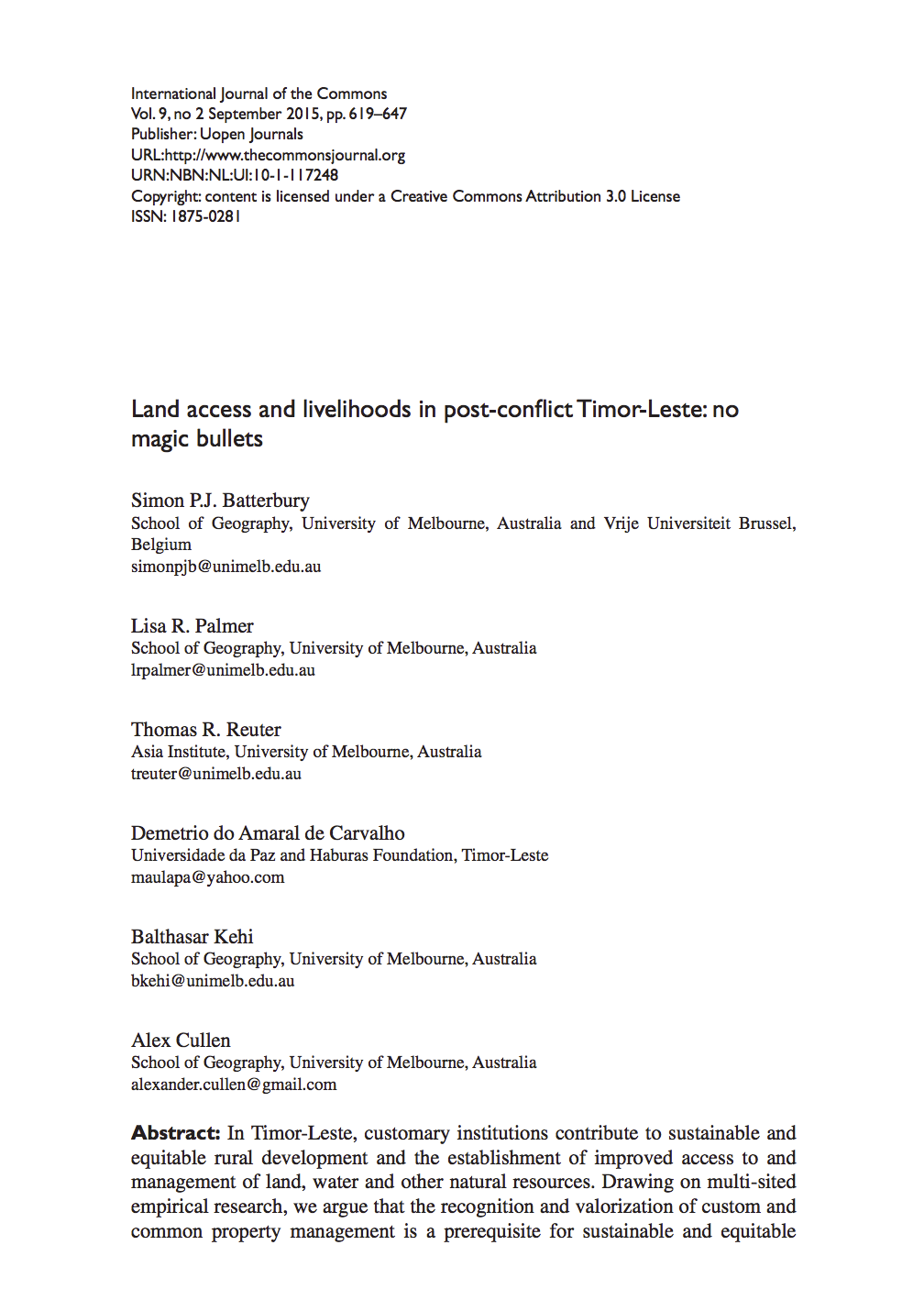política agrária
AGROVOC URI:
Land access and livelihoods in post-conflict Timor-Leste: no magic bullets
In Timor-Leste, customary institutions contribute to sustainable and equitable rural development and the establishment of improved access to and management of land, water and other natural resources. Drawing on multi-sited empirical research, we argue that the recognition and valorization of custom and common property management is a prerequisite for sustainable and equitable land tenure reform in Timor-Leste.
A tale of two villages: An investigation of conservation-driven land tenure reform in a Cambodian Protection Forest
In this paper, we present an analysis of the change in household land use following a conservation-driven process of indigenous land titling reform in a Cambodian protected area. In each of the two study villages, we investigated how household land use had changed and the extent of compliance with both legal boundaries of titled areas and community regulations created to govern land use within these areas. A comparison of current household land holdings in each village with those at the start of the tenure reform process indicated a significant increase in household land holdings.
They will need land! The current land tenure situation and future land allocation needs of smallholder farmers in Cambodia
The objective of this background paper is to provide a succinct description of the land tenure situation in Cambodia and, on that basis, discuss the needs smallholder farmers have for land, projected up to the year 2030.
Allocation or appropriation? How spatial and temporal fragmentation of land allocation policies facilitates land grabbing in Northern Laos
The Lao Land and Forest Allocation Policy (LFAP) was intended to provide clearer property rights for swidden farmers living in mountainous areas. These lands are legally defined as “State” forests but are under various forms of customary tenure. The policy involves demarcating village territorial boundaries, ecological zoning of lands within village territories, and finally allocating a limited number of individual land parcels to specific households for farming.
Forest policy measures influence on the increase of forest cover in northern Laos
The government of the Lao People’s Democratic Republic has made great efforts to halt the rapid decline in forest cover by implementing different policy measures, which include measures: to address the causes of the decline in forest cover; to sustainably manage natural forests; and to regenerate degraded forests. In the last decade, forest cover has continued to decrease at a lower rate of just 1% from 2002 (41.5%) to 2010 (40.3%) at national level; however, there has been a net gain of forests in the northern region.
Intersections of Climate Change Mitigation Policies, Land Grabbing and Conflict in a Fragile State: Insights from Cambodia
Thirty years after Cambodia’s ‘democratization’ by the United Nations Transitional Authority (UNTAC), the transition to a market-based economy is raging at full steam. Democracy remains elusive, but policy interventions from Cambodia’s “development partners” color the political, social, and environmental landscapes. This paper attends to the land grabs characteristic of market transitions and to the climate change mitigation strategies currently enhancing conflicts over land and resources in contemporary Cambodia.
Pro-business or Pro-Poor? Making Sense of the Recently Unveiled Draft National Land Use Policy
On 18 October 2014 the Myanmar government released a much-awaited draft national land use policy. Land and how it is governed is of fundamental importance for Myanmar society. The current laws mainly benefit private companies and not small-holder farmers in the country, who represent more then 75% of the population. The current laws also do not respect traditional and customary practices of the country's ethnic minority groups. This new TNI briefing examines the draft national land policy and assesses whether it is pro-business or pro-poor.
Legal Review of Recently Enacted Farmland Law and Vacant, Fallow and Virgin Lands Management Law: Improving the Legal & Policy Frameworks Relating to Land Management in Myanmar
ABSTRACTED FROM WEB INTRODUCTION AND EXECUTIVE SUMMARY: In order to inform Myanmar’s first multi-stakeholder national dialogue workshop on land tenure and user rights (held November 24th & 25th, 2012), Forest Trend’s Senior Law & Policy Advisor Rob Oberndorf was asked to conduct an in-depth analysis of recently enacted land legislation in the country, and suggest ways in which the legal frameworks relating to rural land management could be improved. This report is the result of that research and analysis assignment.
Agricultural Land Claims in the Red River Delta During Decollectivisation
In this chapter, I adapt the game approach to examine the differences and conformities between formal legal laws and under-law regulations of the party-state institutions and the real practices of the Red river delta villagers on the holding and use of agricultural land. More specifically, this chapter emphasizes official norms, in this case the study of agricultural land claims regarded as formal legal laws and under-law regulations of the party-state institutions.
Agricultural land conversion and its effects on farmers in contemporary Vietnam
Đổi Mới, the name given to the economic reforms initiated in 1986 in Vietnam, has renewed the party-state’s ambitious scheme of industrialization and has intensified the process of urbanization in Vietnam. A large area of land has been converted for these purposes, with various effects on both the state and society. This article sheds light on how land conversion has resulted in farmers’ resistance and in what way and to what extent it has transformed their livelihoods in the transitional context of contemporary Vietnam.
The Gap Between Policy and Practice in Lao PDR
ABSTRACTED FROM THE OPENING PARAGRAPHS, AND THE BOOK BLURB: The decentralization of control over the vast forests of the world is moving at a rapid pace, with both positive and negative ramifications for people and forests themselves. Th[is] chapter examines LFA from the decentralized forest management perspective. In particular, it examines the process by which the policy was implemented and considers whether it helped build sustainable forest management at the community level. [It] first reviews the history of LFA and the major actors involved.


